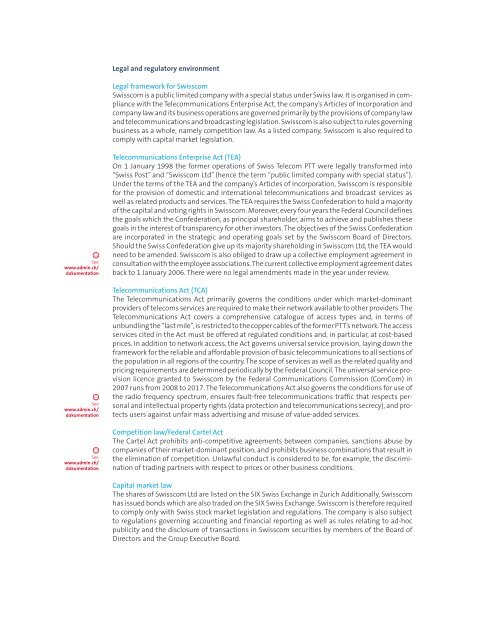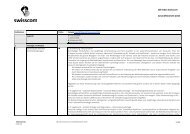Shareholders' Letter
Shareholders' Letter
Shareholders' Letter
Create successful ePaper yourself
Turn your PDF publications into a flip-book with our unique Google optimized e-Paper software.
See<br />
www.admin.ch/<br />
dokumentation<br />
See<br />
www.admin.ch/<br />
dokumentation<br />
See<br />
www.admin.ch/<br />
dokumentation<br />
Legal and regulatory environment<br />
Legal framework for Swisscom<br />
Swisscom is a public limited company with a special status under Swiss law. It is organised in compliance<br />
with the Telecommunications Enterprise Act, the company’s Articles of Incorporation and<br />
company law and its business operations are governed primarily by the provisions of company law<br />
and telecommunications and broadcasting legislation. Swisscom is also subject to rules governing<br />
business as a whole, namely competition law. As a listed company, Swisscom is also required to<br />
comply with capital market legislation.<br />
Telecommunications Enterprise Act (TEA)<br />
On 1 January 1998 the former operations of Swiss Telecom PTT were legally transformed into<br />
“Swiss Post” and “ Swisscom Ltd” (hence the term “public limited company with special status”).<br />
Under the terms of the TEA and the company’s Articles of Incorporation, Swisscom is responsible<br />
for the provision of domestic and international telecommunications and broadcast services as<br />
well as related products and services. The TEA requires the Swiss Confederation to hold a majority<br />
of the capital and voting rights in Swisscom. Moreover, every four years the Federal Council defines<br />
the goals which the Confederation, as principal shareholder, aims to achieve and publishes these<br />
goals in the interest of transparency for other investors. The objectives of the Swiss Confederation<br />
are incorporated in the strategic and operating goals set by the Swisscom Board of Directors.<br />
Should the Swiss Confederation give up its majority shareholding in Swisscom Ltd, the TEA would<br />
need to be amended. Swisscom is also obliged to draw up a collective employment agreement in<br />
consultation with the employee associations. The current collective employment agreement dates<br />
back to 1 January 2006. There were no legal amendments made in the year under review.<br />
Telecommunications Act (TCA)<br />
The Telecommunications Act primarily governs the conditions under which market-dominant<br />
providers of telecoms services are required to make their network available to other providers. The<br />
Telecommunications Act covers a comprehensive catalogue of access types and, in terms of<br />
unbundling the “last mile”, is restricted to the copper cables of the former PTT’s network. The access<br />
services cited in the Act must be offered at regulated conditions and, in particular, at cost-based<br />
prices. In addition to network access, the Act governs universal service provision, laying down the<br />
framework for the reliable and affordable provision of basic telecommunications to all sections of<br />
the population in all regions of the country. The scope of services as well as the related quality and<br />
pricing requirements are determined periodically by the Federal Council. The universal service provision<br />
licence granted to Swisscom by the Federal Communications Commission (ComCom) in<br />
2007 runs from 2008 to 2017. The Telecommunications Act also governs the conditions for use of<br />
the radio frequency spectrum, ensures fault-free telecommunications traffic that respects personal<br />
and intellectual property rights (data protection and telecommunications secrecy), and protects<br />
users against unfair mass advertising and misuse of value-added services.<br />
Competition law/Federal Cartel Act<br />
The Cartel Act prohibits anti-competitive agreements between companies, sanctions abuse by<br />
companies of their market-dominant position, and prohibits business combinations that result in<br />
the elimination of competition. Unlawful conduct is considered to be, for example, the discrimination<br />
of trading partners with respect to prices or other business conditions.<br />
Capital market law<br />
The shares of Swisscom Ltd are listed on the SIX Swiss Exchange in Zurich Additionally, Swisscom<br />
has issued bonds which are also traded on the SIX Swiss Exchange. Swisscom is therefore required<br />
to comply only with Swiss stock market legislation and regulations. The company is also subject<br />
to regulations governing accounting and financial reporting as well as rules relating to ad-hoc<br />
publicity and the disclosure of transactions in Swisscom securities by members of the Board of<br />
Directors and the Group Executive Board.



